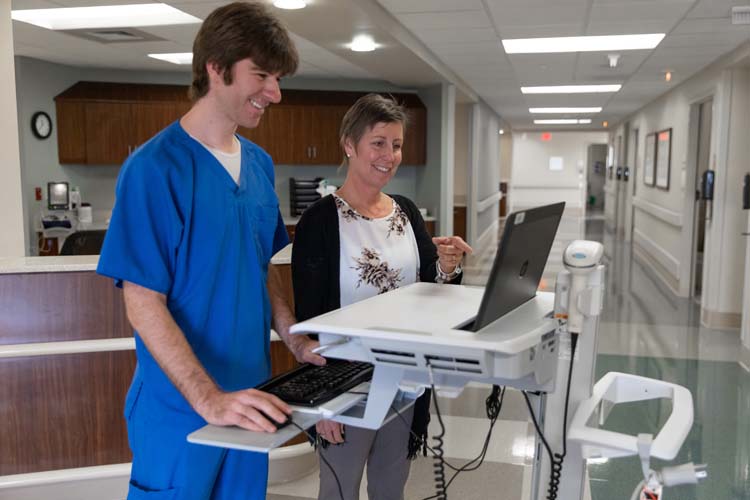
One of the newest and most advanced electronic health record (EHR) systems is now up and running at Sebastian River Medical Center.
That’s in no small part due to the efforts of Debbie Finsted, a staff nurse and in-house clinical systems analyst, nurse leader Stevie Ray, and newly arrived director of education Amy Colletti.
Installation of the system is good news for the hospital, its patients, its staff and the surrounding community.
While many people think EHRs are used exclusively by physicians to order prescription medicines or to provide alerts on patient allergies or potential adverse drug interactions, they actually do much more.
According to Finsted, “all of the nursing assessments, the interventions and everything that a nurse does for a patient go into the EHRs.
“As a seasoned nurse,” Finsted continues, “what I think is great for patients, is that I come in here and most of my information is in the computer. Whereas before, when we were on paper, we would have to start from scratch. I’d take out another piece of paper and ask all the same questions over and over and over again. No longer having to do that is just phenomenal.”
Having the EHR system up and running, Ray adds, “helps create a good rapport with patients. We can say, ‘Hey you were here before.’ Having their history and their medications and everything on the computer” makes the visit better for the patient and the nurse.
A registered nurse, Ray became a part of this transition team almost by accident.
“On the floor when I was just doing my regular nurse job,” he says, “I seemed to be the one who knew the computers and knew how to work all the devices … so they kinda roped me into doing this.”
He is clearly pleased it worked out that way.
“This MediTech system and the electronic health records are helping us provide the best patient care, and our staff has really embraced it,” Ray says. “They’ve been looking … to get away from the paper [records], so everyone’s really excited.”
“In the medical profession it’s very important to keep up to date on the newest practices and newest things coming out. That’s “best practice,” says Colletti.
EHRs are also good for the financial health of the hospital.
As the Centers for Medicare and Medicaid Services puts it, in order to avoid “Medicare payment adjustments” – de facto fines – or to receive “Medicaid incentive payments” – de facto bonuses – healthcare providers must use an EHR that is secure, can maintain data confidentially and can work with other systems to share information.
According to Becker’s Hospital Review, the MediTech EHR software now in use at SRMC meets or exceeds all those requirements.
In fact, says Becker’s, it tops all its competitors in client satisfaction for community hospitals with between 101 and 250 beds, and the global healthcare research firm KLAS just ranked MediTech at the very top of its annual software and service review for the fourth year in a row.
SRMC’s parent company, Steward Health Group, the largest private for-profit hospital operator in the United States, now uses MediTech software in all its 36 hospitals nationwide and the Sebastian facility now has the newest generation, version 6.15.
Often misreported as “electronic medical records” or EMRs, the Office of the National Coordinator for Health Information has repeatedly stated that EMRs and EHRs are not the same thing. “Electronic medical records contain a patient’s clinical data; electronic health records go beyond that to focus on the broader, total health of each patient.”
SRMC’s Leapfrog safety ratings took a serious hit last April largely because – at the time – installation of the MediTech EHR system was still in the planning stages.
As Ray puts it, “we started our real hands-on training probably in May,” a month after that rating was released, so the next report to watch will be the one that comes out next spring.
Hospital president Kelly Enriquez is looking forward to that. “We are excited to implement MediTech at Sebastian River Medical Center. It will allow us to coordinate care in all settings of our hospital, enabling our clinicians to work more efficiently, and enhance quality care and patient safety.
“MediTech will also allow us to meet important CMS guidelines for data reporting, which we expect will result in higher quality benchmarks.”



